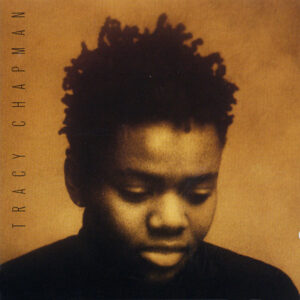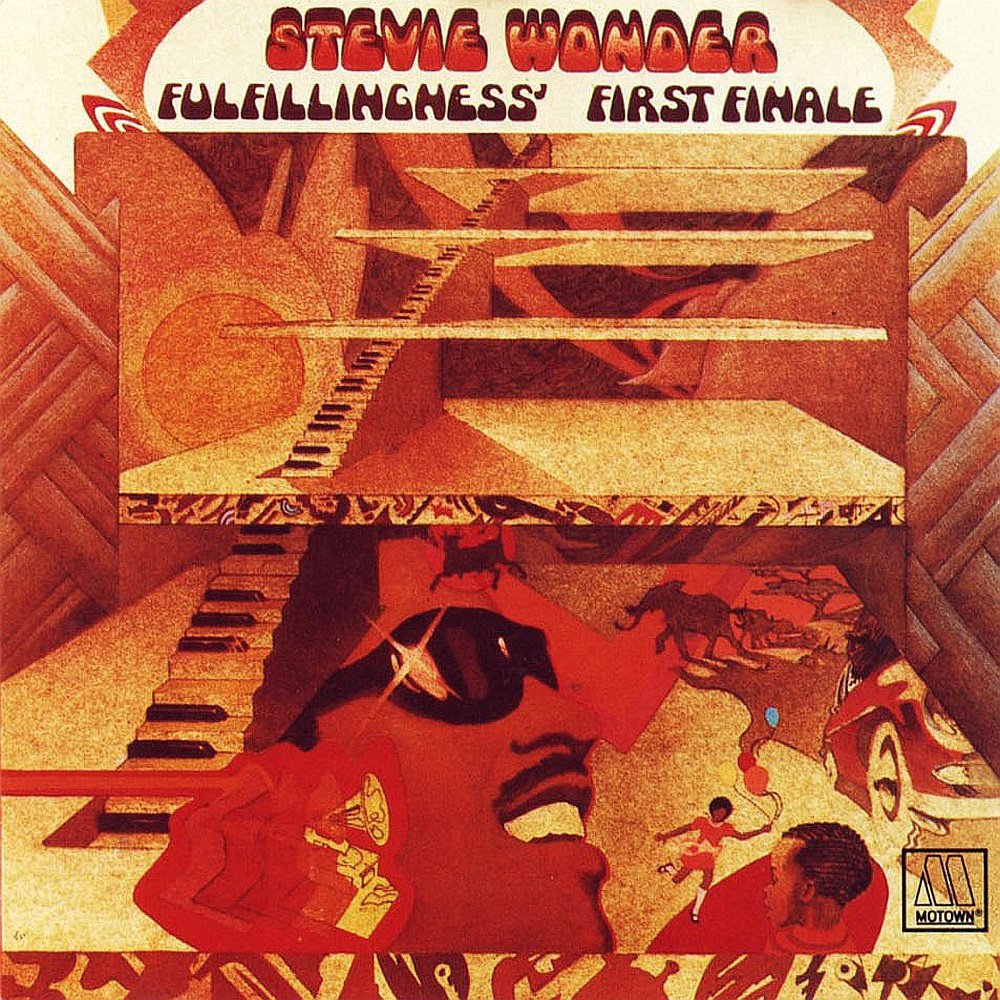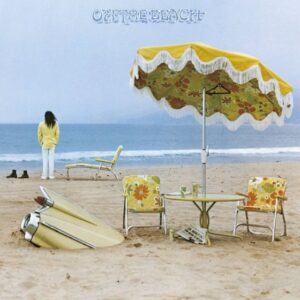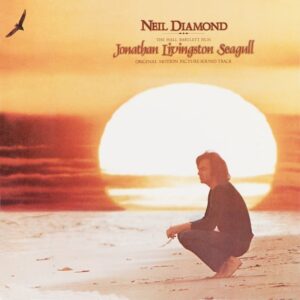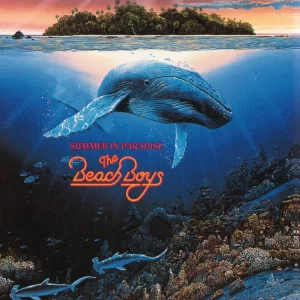
Richard Wayne Mullins was one of the most beloved figures in Christian Contemporary Music. He grew up in Indiana, the son of a tree farmer. Growing up he was influenced by Quaker values of peace and social justice, which permeated through his songwriting. He was influenced by The Beatles, Stephen Stills, Cat Stevens, and Genesis.
Passionate and intelligent, he’s best known for the CCM standard ‘Awesome God’. But he has plenty of more impressive songs, more intimate and introspective. His catalogue can be frustrating, particularly his early solo albums. His limited voice doesn’t suit the booming 1980s production, and he sounded better on his rawer 1990s records. Mullins spent much of his adult life in Wichita – he’s reminiscent of Jimmy Webb, where his recordings don’t always match the quality of his sophisticated songs.
Most worship songs are simple by design for congregational use, but much of Mullins’s work is lyrically and musically sophisticated. He’s a rare CCM artist with enough depth for a music nerd to obsess over.
Mullins had a monastic bent. He liked to play live with bare feet. He entrusted his earnings as a writer to his Church’s elders and requested to be paid a labourer’s wages. He also spent the final years of his life living on a Native American reservation in New Mexico – he explained that “I think I just got tired of a White, Evangelical, middle class perspective on God.” Mullins died in a car accident at the age of 42.
Rich Mullins Album Reviews
Behold the Man (Zion)

1981, 7/10
Mullins formed Zion in the late 1970s while attending Cincinnati Bible College. He’s joined by three other vocalists – Beth Lutz, Tom Weimer, and Jenny Wesner. Mullins writes all the songs and plays piano, while the four share vocals. They recorded one album, which wasn’t widely released and presumably only sold at shows. A copy found its way to Amy Grant’s manager, and her recording of ‘Sing Your Praise to the Lord’ helped to launch Mullins’ career.
Grant’s version of the song is more streamlined than Zion’s – it’s awkward in places. It’s reminiscent of The 2nd Chapter of Acts’ 1970s records with the folk feel and harmonies. Tom Weimer has a pleasantly smooth tenor, but Mullins is the most charismatic vocalist. Five years before his solo debut, he’s already a terrific writer.
‘Praise to the Lord’ and ‘Heaven in His Eyes’ are among Mullins’ most beloved songs. The latter is delivered by Mullins alone, accompanying himself on piano. Mullins revisited ‘Hope to Carry On’ on 1989’s Never Picture Perfect. The baroque, hushed ‘The Way to Love You’ is unique in Mullins’s catalogue for its delicate sound. ‘Nothing in this World’ is an energetic deep-cut worth seeking out.
Behold the Man is a fascinating and overlooked album from Mullins. It’s hard to find but it outclasses his first couple of solo albums.
Deep Valley

2023, recorded 1984, 7/10
The five-year gap in Mullins’ discography has been partially filled by this live release. It was recorded at Deep Valley Christian Camp in Slippery Rock, Pennsylvania. Mullins plays solo at the piano and guitar and is at his most unvarnished.
His vocals struggle to deal with the fast-paced, complex ‘Regions of Light’, and there are some flubbed piano notes on ‘Sing Your Praise to the Lord’. There are often lengthy rants between songs, illustrating Mullins’s fast-paced, restless mind.
For these reasons, it doesn’t stand up well for repeated listens. But it’s a better document of early Rich Mullins than his first two solo records. Only a couple of these songs – ‘Elijah’ and ‘Sing Your Praise to the Lord’ are available elsewhere in Mullins’ catalogues. Some of these songs became famous for other artists, like ‘Doubly Good To You’ and ‘O Come All Ye Faithful’. But a bunch are otherwise unavailable, enjoyable early efforts like ‘the folk-tinged The Courting Song’ with its line “tell me what you gonna do when the well runs dry?” ‘Praise the Lord’ feels incomplete, but there’s a great chorus hook.
Deep Valley is a rare live album that helps tell the artist’s story, rather than a simple cash-in.
Rich Mullins

1986, 4.5/10
There’s a sizeable gap in Mullins’s discography between the Zion record in 1981 and his first solo record in early 1986. During this time, Mullins built his career as a songwriter, placing songs on records by Amy Grant and Debby Boone. This led to his first solo album, recorded in Amy Grant’s new farm studio. Mullins wasn’t particularly interested in the recording process, and the record doesn’t reflect his musical personality. It’s often a dated 1985 mainstream rock sound, and Mullins’s songwriting strengths only sometimes show through.
Most people are surprised to learn that Rich wasn’t particularly involved during recording, simply because he wasn’t interested. He would disappear for long stretches. I would beg him to stay around more, because I was quite worried that he would come back after we’d spent a good deal of time going in a direction and pronounce that he didn’t like it. But he very rarely expressed opinions about things musically. I very rarely had musical discussions with Rich. On the other hand, I had many, many discussions with him about politics, religion, and philosophy. And the music business. But to actually sit and talk about what to ‘do’ with a particular song, no.
Reed Arvin, Christianity Today
The most notable song is ‘Elijah’ – it’s written from the perspective of old age. It’s one of Mullins’ most beloved tracks, included on the compilation Songs, but in a rerecorded version.
The detour into synth-pop in ‘Nothing But A Miracle’ is interesting, suiting Mullins’ sophisticated writing. Like you’d expect from a verbose artist on debut, there’s the odd embarrassing couplet, notably “Save me from any woman who would be turned/On to the aftershave I use” from ‘Save Me’.
Rich Mullins is an unsatisfying debut, with the CCM industry unsure what to do with their talented new writer.
Pictures in the Sky

1987, 6/10
Mullins’ second solo album feels like an overcorrection from the debut. Rich Mullins tried to present him as a rocker. Pictures in the Sky buries his songs under polite soft-rock arrangements. It’s ballad-heavy, but even the bluesy rocker ‘It Don’t Do’ is buried under synths and backing vocals. The songs are stronger than before, so it’s a step forward. But Pictures in the Sky squanders Mullins’ songwriting talent.
The best-loved moment eschews the overstuffed arrangements altogether – ‘Screen Door’ is just vocals and percussion. Mullins lets more personality shine through than before, like the light-hearted ‘What Trouble Are Giants’.
But some of the best songs are buried under overarrangement. ‘Verge of a Miracle’ has a beautifully airy vocal melody, with vulnerable vocals, but it’s uncomfortably close to a 1980s Chicago ballad. The hidden gem is ‘Steal at any Price’. Written with Wayne Kirkpatrick, it uses Mullins’ affecting higher register on the chorus – “He’s a thief in the night”.
It’s a shame Mullins wasn’t around to record a stripped-back version of Pictures in the Sky for its 25th anniversary. It features good songs in need of rescue.
Winds of Heaven, Stuff of Earth
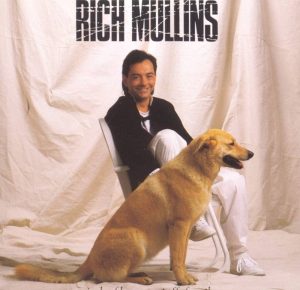
1988, 8.5/10
Mullins suddenly found his solo groove with his third album. It’s not dissimilar in approach to his previous two records, with Reed Arvin producing and playing keyboards. The 1980s CCM sound is still uncomfortable, but it’s punchier and the songs are stronger.
The album features Mullins’s signature song ‘Awesome God’, which is gimmicky and far from the best track. But it signals a run of terrific songs. ‘If I Stand’ dates back to the mid-1970s, while ‘Home’ builds up tension before releasing into a pretty piano riff. ‘Such A Thing Is Glory’ is haunting and pretty, while ‘And I Love You’ has a great vocal hook. The opener ‘The Other Side of the World’ is also strong, inspired by a few weeks Mullins spent in Thailand.
You know, the thing I like about ‘Awesome God’ is that it’s one of the worst-written songs that I ever wrote; it’s just poorly crafted. But the thing is that sometimes, I think, that when you become too conscientious about being a songwriter, the message becomes a vehicle for the medium. This is a temptation that I think all songwriters have. I think a great songwriter is someone who is able to take a very meaningful piece of wisdom — or of folly or whatever — and say it in a way that is most likely to make people respond. But, what you want them to respond to is not how cleverly you did that; what you want them to respond to is your message
Rich Mullins, The Lighthouse Electronic Magazine
After a couple of middling albums, Mullins suddenly emerged as one of the best songwriters of the 1980s on Winds of Heaven.
Never Picture Perfect

1989, 7.5/10
Never Picture Perfect is similar to Winds of Heaven, with Mullins successfully utilising a mainstream 1980s CCM sound. But it’s less consistent, despite some strong tracks. The reworking of Zion’s ‘Hope to Carry On’ and a reprise of ‘The Love of God’ indicate that Mullins might have been short of material.
Mullins evidently took more interest in the recording process than before. He plays instruments on his solo records for the first time, notably contributing hammer dulcimer to ‘My One Thing’.
‘The Love of God’ is one of the more frustrating songs in Mullins’ catalogue. It features memorable lyrics like “keeps me glad to have been caught/in the reckless raging fury/that they call the love of God.” But here it feels both brief and overwrought, with its grand orchestral coda.
My favourite song though, is ‘While The Nations Rage’. It packs profound ideas, a synth flute hook, a huge chorus, and sophisticated chords into a terrific package. ‘Alrightokuhhuhamen’ also has a great chorus.
Never Picture Perfect is a step down from Winds of Heaven but has its share of great moments.
The World as Best as I Remember It, Volume 1

1991, 8/10
Rich Mullins recorded almost enough material for two albums. He released ten songs from the sessions as The World As Best I Remember It, Volume 1. He recorded a handful more songs to complete Volume 2, which was released a year later. It marks a change in emphasis, embracing a lower key, folk-based sound, more in line with Mullins’s influences like Stephen Stills and Genesis. It feels stingy – it’s less than 40 minutes long, and Mullins had more strong songs on hand.
The best-loved song here is ‘Calling Out Your Name’. Mullins plays hammer dulcimer on a starry-eyed tale of creation. Also beloved is ‘Jacob and 2 Women’, where Mullins extracts every ounce of nuance from the Biblical story of Jacob, Rachel, and Leah.
And her sky is just a bandit
Jacob and 2 Women
Swinging at the end of a hangman’s noose
‘Cause he stole the moon and must be made to pay for it
And her friends say, “My, that’s tragic”
She says, “Especially for the moon”
Mullins’ friend Beaker wrote ‘Step by Step’, a simple worship song that opens and closes the album. The stripped-back arrangements are a vast improvement on his 1980s records, like Reed Arvin’s elegant piano on ‘The River’ and Mullins’ lap dulcimer and Tommy Sims’ bass on the bluesy ‘Who God is Gonna Use’.
The World As Best As I Remember It is a successful start to a new decade for Mullins, presenting his music more appropriately than before.
The World as Best as I Remember It, Volume 2

1992, 8/10
This record is clearly a sequel – much of it was recorded at the same time as the first volume. It’s bookended by two versions of ‘Sometimes by Step’, an expanded version of ‘Step by Step’, with additional verses by Mullins. It’s maybe a little sedate, but it’s still one of Mullins’ stronger records, full of high-quality, sophisticated CCM.
It branches out sometimes – ‘To Tell Them’ is vocally-driven gospel, with a simple piano accompaniment. ‘All The Way My Savior Leads Me’ is an adaptation of a hymn. But the meat of the record is Mullins’s superb writing on songs like ‘Everyman’, ‘Growing Young’, and ‘What Susan Said’, ‘Maker of Noses’ was apparently written in the studio by Beaker and Mullins to fill out the album, but it’s one of the best songs here.
The second volume of The World As Best As I Remember It is arguably a smidge weaker than the first, but it’s one of Mullins’s finest.
A Liturgy, a Legacy, and a Ragamuffin Band

1993, 9/10
Mullins recruited friends to form a backing band for his seventh album. They were chosen for their scruffiness, and he named them the Ragamuffin Band, after the book The Ragamuffin Gospel. The backing band helps, bringing a folk-tinged, rawer sound that suits Mullins’ heartfelt songs.
Drummer Aaron Smith was perhaps the most notable member of the Ragamuffin band – he played on The Temptations ‘Papa Was A Rolling Stone’ at 20. It’s the album where everything comes together for Mullins. It features his best backing band and his best batch of songs, and it’s structured thoughtfully.
Cuts 2–6 of this album loosely follow the pattern of a liturgy – a tool used for collective worship. In it there is proclamation, praise, confession of sin, affirmation of faith and celebration of grace. Cuts 7–12 are a consideration of our “secular” heritage, issues and ideas that play themselves out in the history of our country.
A Liturgy, a Legacy, & a Ragamuffin Band, liner notes
The sequence works musically too. There’s a terrific transition from the intensity of ’52:10′ to the stripped-back beginning of the Celtic-flavoured ‘The Color Green’. The emotionally charged, simple ‘Hold Me Jesus’ is one of Mullins’ most-loved songs. ‘Creed’ sets the Apostles’ Creed to music effectively. Even the least remarkable track musically, ‘Hard’, has some memorable lines “Well I am a good Midwestern boy/I give an honest day’s work if I can get it”.
A Liturgy… is Mullins’ clear career peak.
Brother’s Keeper

1995, 7/10
Mullins’s last studio album is his only solo record not produced by Reed Arvin. Instead, it was produced by the members of the Ragamuffin Band. The band played most of the instruments, with wives and friends providing backing vocals. The homespun sound feels more true to Mullins’ creative vision than much of his catalogue. But it’s Mullins’ weakest batch of songs since his early solo career.
Particularly, Brother’s Keeper is short of catchy singles. Only ‘Let Mercy Lead’, with its big harmonised chorus, feels like it belongs on a hits collection.
But for a Mullins aficionado, there are plenty of deep cuts to get lost in. ‘Road to Damascus’ was written in the early 1980s, with Mullins restating his faith after his broken engagement. ‘The Breaks’ taps into the same sense of wonder of creation as ‘Calling Out Your Name’. ‘Quoting Deuteronomy to the Devil’ taps into a nice bluesy sound.
Brother’s Keeper is a little disappointing for a final album from a genius songwriter, but fans will still want to hear it.
Songs

1996, 8/10
Songs is a greatest hits album. Mullins isn’t the easiest artist to compile as his two different eras – the CCM of the 1980s and the folkier material of the 1990s feel weirdly squashed together here. And the gimmicky tracks like ‘Awesome God’ and ‘Screen Door’ dominate the record’s tone. Even though it puts most of his best stuff in one place, I didn’t become a dedicated fan until I picked up his studio albums.
It’s notable for four otherwise unavailable recordings. There’s a longer radio edit of ‘Screen Door’ and a new song written during the Brother’s Keeper era, ‘We Are Not As Strong As We Think We Are’. Two songs from Mullins’ early career are rerecorded – Zion’s ‘Sing Your Praise to the Lord’ and ‘Elijah’ from the debut.
A companion album, Songs 2, was released in 1998. It feels like a random selection of deep cuts, and it’s a shame it didn’t take in The Jesus Record and Canticle of the Plains.
Canticle of the Plains

1997
It’s tricky to find this album – it’s not on Spotify. Mullins doesn’t sing, but he’s the mastermind behind it. It’s a musical about St Francis of Assisi, with the story transposed to the American West. Vocalists include Leigh Nash and DC Talk’s Kevin Max and Michael Tait.
The Jesus Record

1998, 7/10
Mullins recorded nine demos in an abandoned church the week before he died. The Jesus Record was planned to be thematic, with every song focusing on Jesus and based on scripture. After Mullins’ death, the rest of the Ragamuffin band completed the project.
They’re accompanied by Amy Grant, Phil Keaggy, Ashley Cleveland, and Michael W Smith on guest vocals. It’s presented as two discs, the first with Mullins’ simple demos and the second with the fully-fledged version.
It’s inconsistent, with a few songs more simplistic than you’d expect from Mullins, like the bluesy ‘You Did Not Have A Home’ and the generic rocker ‘All The Way to Kingdom Come’. But the best songs are sublime. Grant contributes a typically excellent vocal to ‘Nothing Is Beyond You’. It should be a worship standard, but it’s too sophisticated for your average worship band to play.
The opener ‘My Deliverer’ is also stirring with Ragamuffin Rick Elias sharing a similar vocal style to Mullins, making him a fine substitute. Michael W Smith delivers a smooth version of ‘Heaven in His Eyes’, originally on the 1981 Zion album. ‘Hard to Get’ is a rare moment of doubt and searching on a CCM record, with Elias singing “Will those who mourn be left uncomforted/While You’re up there just playin’ hard to get?”
The Jesus Record does a fine job of presenting Mullins’ final songs.
10 Best Rich Mullins Songs
While the Nations Rage
Nothing Is Beyond You
Sing Your Praise to the Lord
Calling Out Your Name
Hold Me Jesus
If I Stand
Jacob and 2 Women
The Colour Green
Hard To Get
Steal At Any Price
10 more…
I’ll Carry On
My Deliverer
And I Love You
Let Mercy Lead
Creed
Sometimes By Step
Alrightokuhhuhamen
The Breaks
Elijah
Maker of Noses or Everyman
Related Pages
Review Pages
Read about the discographies of musical acts from the 1960s to the present day. Browse this site's review archives or enjoy these random selections:
Blog Posts
I add new blog posts to this website every week. Browse the archives or enjoy these random selections:




